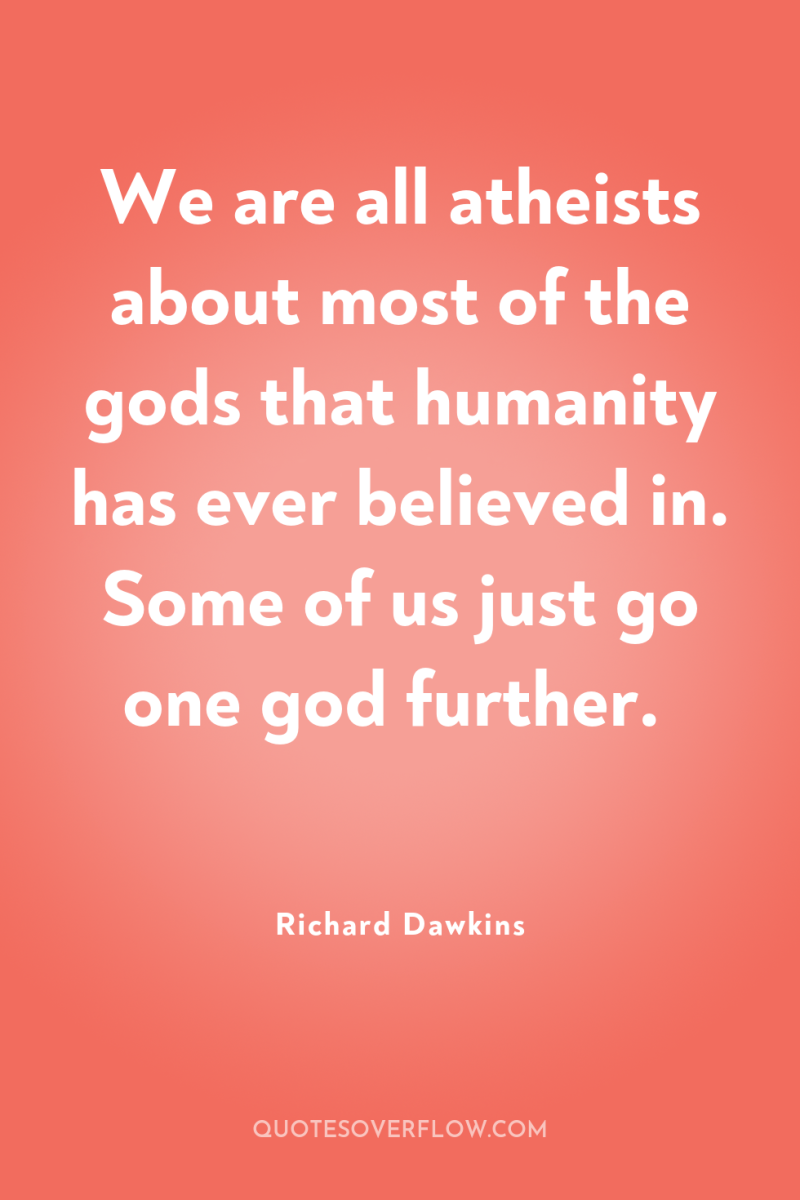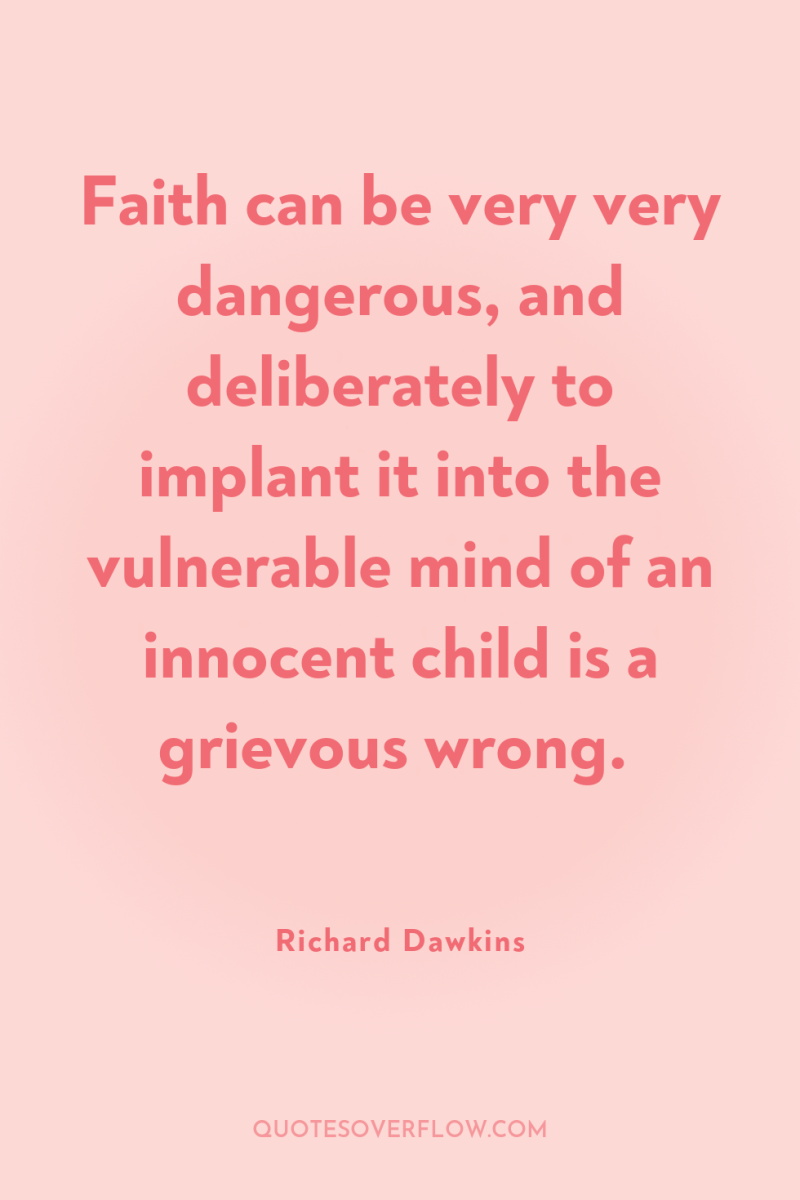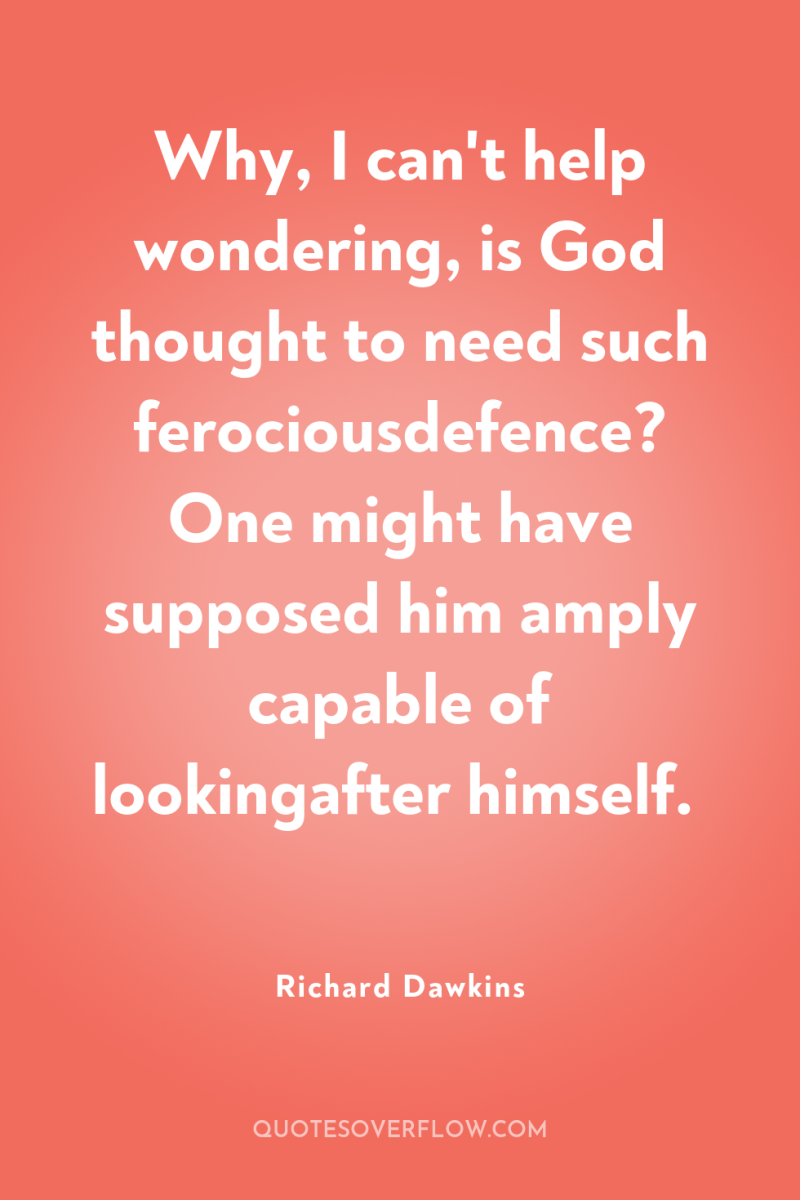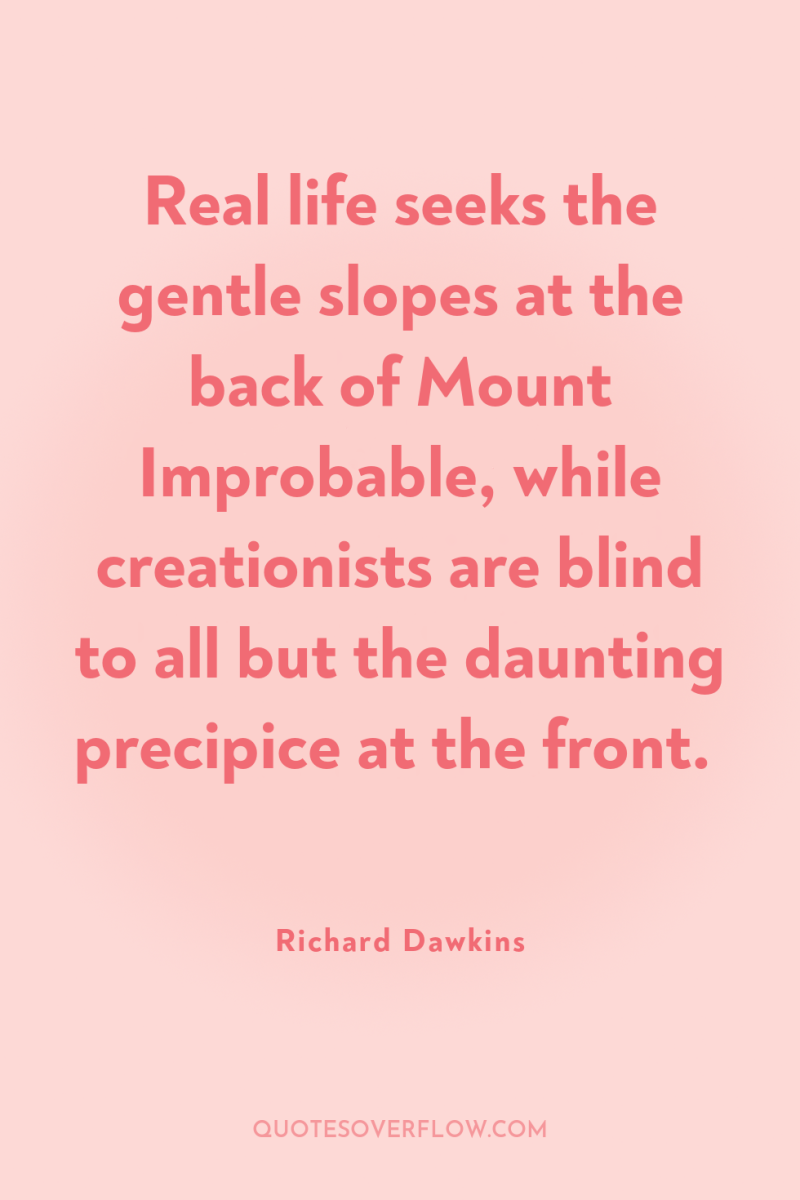
1
We are all atheists about most of the gods that humanity has ever believed in. Some of us just go one god further.Richard Dawkins
2
Creationists eagerly seek a gap in present-day knowledge or understanding. If an apparent gap is found, it is assumed that God, by default, must fill it.Richard Dawkins
3
The God of the Old Testament is arguably the most unpleasant character in all fiction: jealous and proud of it; a petty, unjust, unforgiving control-freak; a vindictive, bloodthirsty ethnic cleanser; a misogynistic, homophobic, racist, infanticidal, genocidal, filicidal, pestilential, megalomaniacal, sadomasochistic, capriciously malevolent bully.Richard Dawkins
4
Do you really mean to tell me the only reason you try to be good is to gain God's approval and reward, or to avoid his disapproval and punishment? That's not morality, that's just sucking up, apple-polishing, looking over your shoulder at the great surveillance camera in the sky, or the still small wiretap inside your head, monitoring your every move, even your every base though.Richard Dawkins
5
There is something infantile in the presumption that somebody else (parents in the case of children, God in the case of adults) has a responsibility to give your life meaning and point.. .. The truly adult view, by contrast, is that our life is as meaningful, as full and as wonderful as we choose to make it. And we can make it very wonderful indeed.Richard Dawkins

6
Faith can be very very dangerous, and deliberately to implant it into the vulnerable mind of an innocent child is a grievous wrong.Richard Dawkins
7
A child is not a Christian child, not a Muslim child, but a child of Christian parents or a child of Muslim parents. This latter nomenclature, by the way, would be an excellent piece of consciousness-raising for the children themselves. A child who is told she is a 'child of Muslim parents' will immediately realize that religion is something for her to choose -or reject- when she becomes old enough to do so.Richard Dawkins
8
To be fair, much of the Bible is not systematically evil but just plain weird, as you would expect of a chaotically cobbled-together anthology of disjointed documents, composed, revised, translated, distorted and 'improved' by hundreds of anonymous authors, editors and copyists, unknown to us and mostly unknown to each other, spanning nine centuriesRichard Dawkins
9
The take-home message is that we should blame religion itself, not religious extremism - as though that were some kind of terrible perversion of real, decent religion. Voltaire got it right long ago: 'Those who can make you believe absurdities can make you commit atrocities.' So did Bertrand Russell: 'Many people would sooner die than think. In fact they do.Richard Dawkins

10
Why, I can't help wondering, is God thought to need such ferociousdefence? One might have supposed him amply capable of lookingafter himself.Richard Dawkins

11
Do those people who hold up the Bible as an inspiration tomoral rectitude have the slightest notion of what is actually writtenin it?Richard Dawkins

12
Real life seeks the gentle slopes at the back of Mount Improbable, while creationists are blind to all but the daunting precipice at the front.Richard Dawkins
13
A god who is capable of sending intelligible signals to millions of people simultaneously, and of receiving messages from all of them simultaneously, cannot be, whatever else he might be, simple. Such Bandwidth!Richard Dawkins
14
.. the reason why we find some things intuitively easy to grasp and others hard, is that our brains are themselves evolved organs: on-board computers, evolved to help us survive in a world (..) where the objects that mattered to our survival were neither very large nor very small; a world where things either stood still or moved slowly compared with the speed of light; and where the very improbable could safely be treated as impossible. Our mental burka window is narrow because it didn't need to be any wider in order to assist our ancestors to survive.Richard Dawkins
15
Do not indoctrinate your children. Teach them how to think for themselves, how to evaluate evidence, and how to disagree with you.Richard Dawkins
16
There is something distinctly odd about the argument, however. Believing is not something you can decide to do as a matter of policy. At least, it is not something I can decide to do as an act of will. I can decide to go to church and I can decide to recite the Nicene Creed, and I can decide to swear on a stack of bibles that I believe every word inside them. But none of that can make me actually believe it if I don't. Pascal's Wager could only ever be an argument for feigning belief in God. And the God that you claim to believe in had better not be of the omniscient kind or he'd see through the deception. .Richard Dawkins
17
We are talking about a bet, remember, and Pascal wasn't claiming that his wager enjoyed anything but very long odds. Would you bet on God's valuing dishonestly faked belief (or even honest belief) over honest scepticism?Richard Dawkins
18
However statistically improbable the entity you seek to explain by invoking a designer, the designer himself has got to be at least as improbable. God is the Ultimate Boeing 747.Richard Dawkins
19
Pantheism is sexed-up atheism. Deism is watered-down theism.Richard Dawkins
20
Oh golly, Brer Fox, your forthright assertion–that evolutionary biology disproves the idea of a creator God–jeopardises the teaching of biology in science class, since teaching that would violate the separation of church and state! ' Right. You also ought to soft-pedal physiology, since it declares virgin birth impossibleRichard Dawkins
21
I have considered the impudent accusations of Mr Dawkins with exasperation at his lack of serious scholarship. He has apparently not read the detailed discourses of Count Roderigo of Seville on the exquisite and exotic leathers of the Emperor's boots, nor does he give a moment's consideration to Bellini's masterwork, On the Luminescence of the Emperor's Feathered Hat. We have entire schools dedicated to writing learned treatises on the beauty of the Emperor's raiment, and every major newspaper runs a section dedicated to imperial fashion. . Dawkins arrogantly ignores all these deep philosophical ponderings to crudely accuse the Emperor of nudity. . Until Dawkins has trained in the shops of Paris and Milan, until he has learned to tell the difference between a ruffled flounce and a puffy pantaloon, we should all pretend he has not spoken out against the Emperor's taste. His training in biology may give him the ability to recognize dangling genitalia when he sees it, but it has not taught him the proper appreciation of Imaginary Fabrics.Richard Dawkins
22
It is a tedious cliché (and, unlike many clichés, it isn't even true) that science concerns itself with how questions, but only theology is equipped to answer why questions. What on Earth is a why question? Not every English sentence beginning with the word 'why' is a legitimate question. Why are unicorns hollow? Some questions simply do not deserve an answer. What is the colour of abstraction? What is the smell of hope? The fact that a question can be phrased in a grammatically correct English sentence doesn't make it meaningful, or entitle it to our serious attention. Nor, even if the question is a real one, does the fact that science cannot answer it imply that religion can.Richard Dawkins
23
That scientifically savvy philosopher Daniel Dennett pointed out that evolution counters one of the oldest ideas we have: 'the idea that it takes a big fancy smart thing to make a lesser thing. I call that the trickle-down theory of creation.Richard Dawkins
24
Evil…doesn’t mean doing things that have bad consequences for people. It means private thoughts and actions that are not to “the Christian majority’s” private liking.Richard Dawkins
25
More generally, as I shall repeat in Chapter 8, one of the truly bad effects of religion is that it teaches us that it is a virtue to be satisfied with not understanding.Richard Dawkins
26
The fact that it has nothing else to contribute to human wisdom is no reason to hand religion a free licence to tell us what to do. Which religion, anyway? The one in which we happen to have been brought up? To which chapter, then, of which book of the Bible should we turn–for they are far from unanimous and some of them are odious by any reasonable standards. How many literalists have read enough of the Bible to know that the death penalty is prescribed for adultery, for gathering sticks on the sabbath and for cheeking your parents? If we reject Deuteronomy and Leviticus (as all enlightened moderns do), by what criteria do we then decide which of religion's moral values to accept? Or should we pick and choose among all the world's religions until we find one whose moral teaching suits us? If so, again we must ask, by what criterion do we choose? And if we have independent criteria for choosing among religious moralities, why not cut out the middle man and go straight for the moral choice without the religion? .Richard Dawkins
27
If this dysfunctional family was the best Sodom had to offer by way of morals, some might begin to feel a certain sympathy with God and his judicial brimstone.Richard Dawkins
28
Creationists eagerly seek a gap in present-day knowledge or understanding. If an apparent gap is found, it is assumed that God, by default, must fill it. What worries thoughtful theologians such as Bonhoeffer is that gaps shrink as science advances, and God is threatened with eventually having nothing to do and nowhere to hide.Richard Dawkins
29
Maybe scientists are fundamentalist when it comes to defining in some abstract way what is meant by 'truth'. But so is everybody else. I am no more fundamentalist when I say evolution is true than when I say it is true that New Zealand is in the southern hemisphere. We believe in evolution because the evidence supports it, and we would abandon it overnight if new evidence arose to disprove it.Richard Dawkins
30
There is something infantile in the presumption that somebody else (parents in the case of children, God in the case of adults) has a responsibility to give your life meaning and point.Richard Dawkins
31
It is possible to conceive, Anselm said, of a being than which nothing greater can be conceived. Even an atheist can conceive of such a superlative being, though he would deny its existence in the real world. But, goes the argument, a being that doesn't exist in the real world is, by that very fact, less than perfect. Therefore we have a contradiction and, hey presto, God exists!Richard Dawkins
32
I have found it an amusing strategy, when asked whether I am an atheist, to point out that the questioner is also an atheist when considering Zeus, Apollo, Amon Ra, Mithras, Baal, Thor, Wotan, the Golden Calf and the Flying Spaghetti Monster. I just go one god further.Richard Dawkins
33
The whole point of religious faith, its strength and chief glory, is that it does not depend on rational justification. The rest of us are expected to defend our prejudices. But ask a religious person to justify their faith and you infringe 'religious liberty'.Richard Dawkins
34
We can give up belief in God while not losing touch with a treasured heritage.Richard Dawkins
35
If God wanted to forgive our sins, why not just forgive them, without having himself tortured and executed in payment–thereby, incidentally, condemning remote future generations of Jews to pogroms and persecution as 'Christ-killers': did that hereditary sin pass down in the semen too?Richard Dawkins
36
When challenged by a zealous Popperian to say how evolution could ever be falsified, J. B. S. Haldane famously growled: 'Fossil rabbits in the Precambrian.Richard Dawkins
37
Darwin himself said as much: 'If it could be demonstrated that any complex organ existed which could not possibly have been formed by numerous, successive, slight modifications, my theory would absolutely break down. But I can find no such case.' Darwin could find no such case, and nor has anybody since Darwin's time, despite strenuous, indeed desperate, efforts. Many candidates for this holy grail of creationism have been proposed. None has stood up to analysis. .Richard Dawkins
38
Natural selection is not only a parsimonious, plausible and elegant solution; it is the only workable alternative to chance that has ever been suggested. Intelligent design suffers from exactly the same objection as chance. It is simply not a plausible solution to the riddle of statistical improbability. And the higher the improbability, the more implausible intelligent design becomes. Seen clearly, intelligent design will turn out to be a redoubling of the problem. Once again, this is because the designer himself (/herself/itself) immediately raises the bigger problem of his own origin. Any entity capable of intelligently designing something as improbable as a Dutchman's Pipe (or a universe) would have to be even more improbable than a Dutchman's Pipe. Far from terminating the vicious regress, God aggravates it with a vengeance.Richard Dawkins
39
Darwin singled out the eye as posing a particularly challenging problem: 'To suppose that the eye with all its inimitable contrivances for adjusting the focus to different distances, for admitting different amounts of light, and for the correction of spherical and chromatic aberration, could have been formed by natural selection, seems, I freely confess, absurd in the highest degree.' Creationists gleefully quote this sentence again and again. Needless to say, they never quote what follows. Darwin's fulsomely free confession turned out to be a rhetorical device. He was drawing his opponents towards him so that his punch, when it came, struck the harder. The punch, of course, was Darwin's effortless explanation of exactly how the eye evolved by gradual degrees. Darwin may not have used the phrase 'irreducible complexity', or 'the smooth gradient up Mount Improbable', but he clearly understood the principle of both. 'What is the use of half an eye?' and 'What is the use of half a wing?' are both instances of the argument from 'irreducible complexity'. A functioning unit is said to be irreducibly complex if the removal of one of its parts causes the whole to cease functioning. This has been assumed to be self-evident for both eyes and wings. But as soon as we give these assumptions a moment's thought, we immediately see the fallacy. A cataract patient with the lens of her eye surgically removed can't see clear images without glasses, but can see enough not to bump into a tree or fall over a cliff. Half a wing is indeed not as good as a whole wing, but it is certainly better than no wing at all. Half a wing could save your life by easing your fall from a tree of a certain height. And 51 per cent of a wing could save you if you fall from a slightly taller tree. Whatever fraction of a wing you have, there is a fall from which it will save your life where a slightly smaller winglet would not. The thought experiment of trees of different height, from which one might fall, is just one way to see, in theory, that there must be a smooth gradient of advantage all the way from 1 per cent of a wing to 100 per cent. The forests are replete with gliding or parachuting animals illustrating, in practice, every step of the way up that particular slope of Mount Improbable. By analogy with the trees of different height, it is easy to imagine situations in which half an eye would save the life of an animal where 49 per cent of an eye would not. Smooth gradients are provided by variations in lighting conditions, variations in the distance at which you catch sight of your prey–or your predators. And, as with wings and flight surfaces, plausible intermediates are not only easy to imagine: they are abundant all around the animal kingdom. A flatworm has an eye that, by any sensible measure, is less than half a human eye. Nautilus (and perhaps its extinct ammonite cousins who dominated Paleozoic and Mesozoic seas) has an eye that is intermediate in quality between flatworm and human. Unlike the flatworm eye, which can detect light and shade but see no image, the Nautilus 'pinhole camera' eye makes a real image; but it is a blurred and dim image compared to ours. It would be spurious precision to put numbers on the improvement, but nobody could sanely deny that these invertebrate eyes, and many others, are all better than no eye at all, and all lie on a continuous and shallow slope up Mount Improbable, with our eyes near a peak–not the highest peak but a high one.Richard Dawkins
40
Evolutionary psychologists suggest that, just as the eye is an evolved organ for seeing, and the wing an evolved organ for flying, so the brain is a collection of organs (or 'modules') for dealing with a set of specialist data-processing needs.Richard Dawkins
41
It is a strange fact, incidentally, that religious apologists love the anthropic principle. For some reason that makes no sense at all, they think it supports their case. Precisely the opposite is true. The anthropic principle, like natural selection, is an alternative to the design hypothesis. It provides a rational, design-free explanation for the fact that we find ourselves in a situation propitious to our existence.Richard Dawkins
42
Most of us happily disavow fairies, astrology and the Flying Spaghetti Monster, without first immersing ourselves in books of Pastafarian theology etc.Richard Dawkins
43
And some scientists and other intellectuals are convinced–too eagerly in my view–that the question of God's existence belongs in the forever inaccessible PAP category. From this, as we shall see, they often make the illogical deduction that the hypothesis of God's existence, and the hypothesis of his non-existence, have exactly equal probability of being right.Richard Dawkins
44
The fact that we can neither prove nor disprove the existence of something does not put existence and non-existence on an even footing.Richard Dawkins
45
Isaac Asimov's remark about the infantilism of pseudoscience is just as applicable to religion: 'Inspect every piece of pseudoscience and you will find a security blanket, a thumb to suck, a skirt to hold.' It is astonishing, moreover, how many people are unable to understand that 'X is comforting' does not imply 'X is true'.Richard Dawkins
46
If all the evidence in the universe turned in favour of creationism, I would be the first to admit it, and I would immediately change my mind. As things stand, however, all available evidence (and there is a vast amount of it) favours evolution.Richard Dawkins
47
Less abject but more shocking was the letter from the Founder of the Calvary Tabernacle Association in Oklahoma: Professor Einstein, I believe that every Christian in America will answer you, 'We will not give up our belief in our God and his son Jesus Christ, but we invite you, if you do not believe in the God of the people of this nation, to go back where you came from.' I have done everything in my power to be a blessing to Israel, and then you come along and with one statement from your blasphemous tongue, do more to hurt the cause of your people than all the efforts of the Christians who..Richard Dawkins
48
As J. B. S. Haldane said when asked what evidence might contradict evolution, 'Fossil rabbits in the Precambrian.Richard Dawkins
49
Indeed, organizing atheists has been compared to herding cats, because they tend to think independently and will not conform to authority. But a good first step would be to build up a critical mass of those willing to 'come out, ' thereby encouraging others to do so. Even if they can't be herded, cats in sufficient numbers can make a lot of noise and they cannot be ignored.Richard Dawkins
50
Indeed, organizing atheists has been compared to herding cats, because they tend to think independently and will not conform to authority.Richard Dawkins